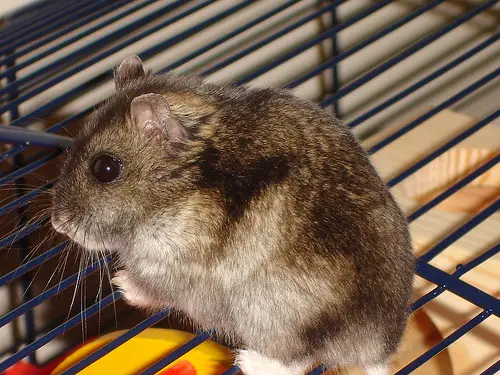The Campbell’s Russian is the most common type of dwarf hamster available.
Appearance

Campbell’s Russian dwarf hamsters, also known as Djungarian hamsters in America, are normally a gray-brown color that becomes creamier on the sides. They also have a white belly, a dark dorsal stripe along the length of their back, and furred feet. Like Syrian hamsters, however, there are a wide variety of color variations.
They can be similar in appearance to Winter White Russians and may be mislabelled in pet stores, but Campbell’s Russians are more common.
Size
Adult Campbell’s Russians are round-bodied and approximately 4 inches in length. Like other dwarf hamsters, their small size, as well as their speed and agility, can make them hard to handle for young children.
Expected Life Span
A Campbell’s Russian dwarf hamster can be expected to live for between 1.5 and 2 years, the same as a Winter White Russian. Both of these dwarf species therefore have a much shorter life span than other types of hamster.
Care
Campbell’s Russians are generally friendly but they are not as tame as the Syrian hamster and have a reputation for nipping when nervous or roughly handled. They should therefore not be handled by small children.
Despite their small size, they are extremely active and so should be housed in as large a cage as possible to give them the space they need to prevent boredom. A solid sided cage or an aquarium would be the most suitable choice of housing as they are small enough to squeeze through the bars of most wire hamster cages.
They can normally be safely housed with other Campbell’s Russians if kept in same-sex pairs or small groups, but if you do want to house more than one together then they will need to be introduced at a young age. Even then, it is still possible that the hamsters need to be separated after they mature. New hamsters should never be introduced to a group.
Campbell’s Russians are fairly prone to diabetes, therefore it is best to avoid feeding them fruit or sugary treats.